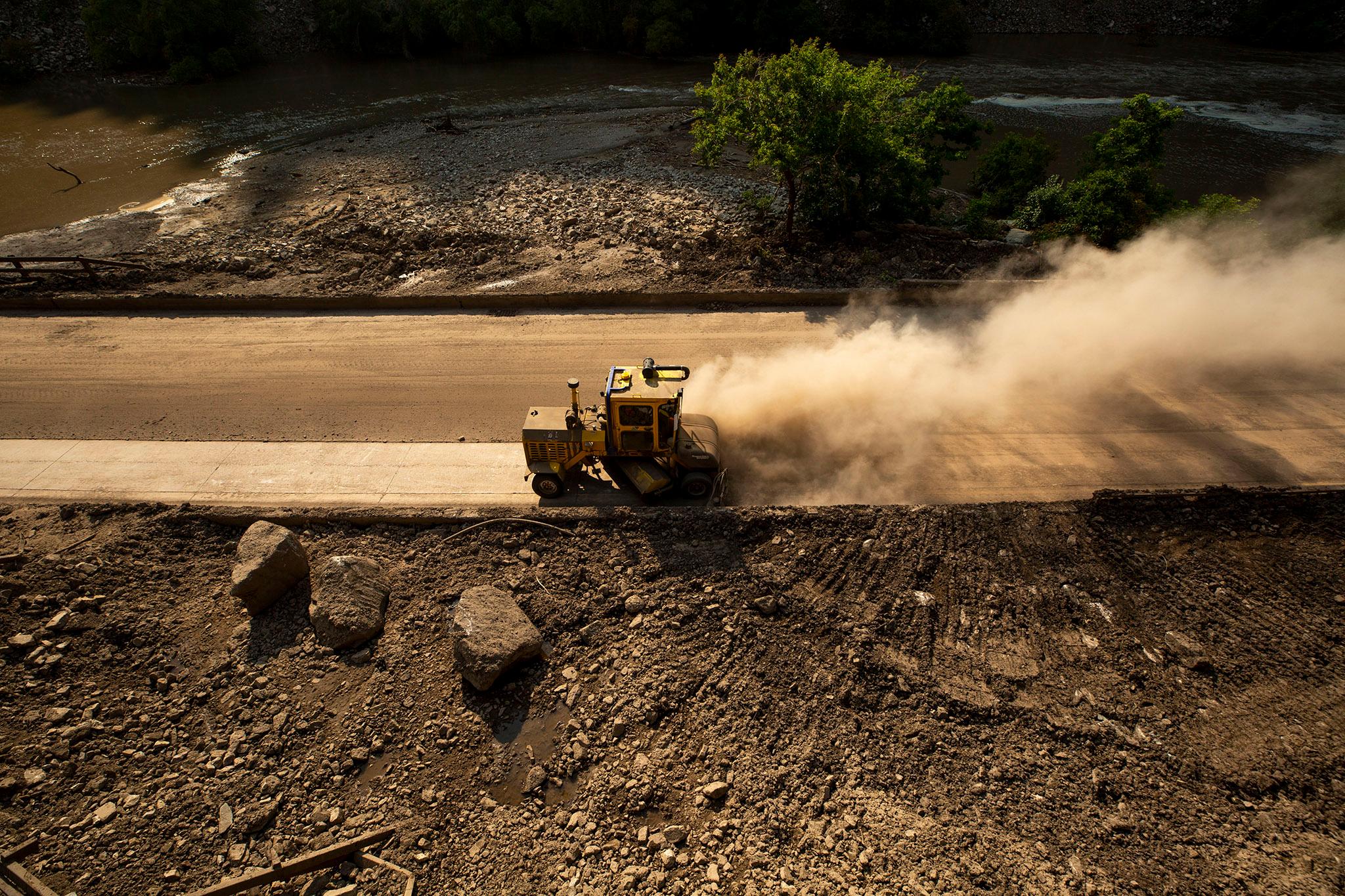
It’s a priority to get Interstate 70 in Glenwood Canyon repaired and reopened, but Colorado Sen. Michael Bennet said there also needs to be an investment in transportation stability across the state.
The Democrat said the infrastructure deal now in Congress is a key element toward that plan.
“This is an historic … once-in-a-lifetime investment that we’re making in roads and bridges throughout the country. Colorado will benefit from that,” Bennet told Colorado Matters host Avery Lill. “More than $2 billion is going to come to Colorado for transportation and even more money than that, another $900 million for transit. So I think there's going to be an awful lot of investment throughout our state to make permanent improvements to Glenwood Canyon and other places to better protect the traveling public from these kinds of mudslides and other events like fires.”
Bennet said that includes exploring alternative routes to I-70, such as Cottonwood Pass.
“I've been up over Cottonwood Pass twice since these slides happened and it is definitely in need of improvement,” he said.
Interview Highlights
On investing in broadband infrastructure:
“The pandemic revealed how critical broadband is. It is basic infrastructure. I mean, if you've got kids in one community who don't have access to broadband and kids in another that do, that's tantamount to accepting a world where some kids have access to textbooks and other kids don't. That's the history of the United States. We've had moments like that in our country's history. Those were not our shining moments. For our kids and for the economic development of Colorado, especially in rural areas, it's important for us to make these changes.”
On extending the Child Care Tax Credit:
“(It’s) really important to me because I've worked on it for a long time. And we're already seeing, the Census Bureau did a survey last month of the way people use the child tax credit. Forty-seven percent of people used it to buy food for their families. I think another twenty-some percent used it to pay for child care. That's exactly, exactly what we thought would happen when we passed it as part of the American Rescue Plan. Now we've got to try to extend it for as long a period as we can through reconciliation.
Read the Transcript
Avery Lill: Sen. Bennett. Welcome back to the program.
Sen. Michael Bennet: Thanks so much for having me.
AL: Gov. Jared Polis announced that the state secured $11.6 million of federal funding to help with I-70, but that's only 10 percent of the total request. Will there be more federal dollars coming in the future?
MB: There definitely will be. The governor put his request in for about I think $116 million on a Monday and $10 million was sent our way on the following, on the next day, Tuesday. So I think the administration understands how vital I-70 is and we will work with the governor and the entire delegation to make sure that we get the resources that we need to be able to recover from this event.
AL: How quickly do you expect those resources to come Colorado’s way?
MB: We're going to push to get it as quickly as we can.
AL: Closing the highway, it’s disrupted tourism on the Western slope and supply chains. Will there be any federal relief for those businesses?
MB: We haven't had a discussion about that yet. I think the focus right now is trying to get it open as quickly as we can. And back to normal. That's probably the most important thing we could do for the small businesses that are suffering from this closure. I'm heading to Grand Junction to have a meeting with the small businesses there and maybe I'll learn something there that will help us think of more imaginative approaches.
AL: And does whether or not those businesses get federal relief depends somewhat on how much and when those federal dollars come in the future?
MB: I think the most, as I said, I really think the most important thing to everybody is focused on getting the road back open and that's what we're trying to do.
AL: Is there any money in the infrastructure deal that could help make that transportation corridor perhaps more stable in the future?
MB: There is an historic generation, once-in-a-lifetime investment that we're making in roads and bridges throughout the country, Colorado will benefit from that. More than $2 billion is going to come to Colorado for transportation and even more money than that, another $900 million for transit. So I think there's going to be an awful lot of investment throughout our state to make permanent improvements to Glenwood Canyon and other places to better protect the traveling public from these kinds of mudslides and other events like fires.
AL: When you say other places could that mean alternative routes to Glenwood Canyon?
MB: It could mean alternative routes. And I know that the governor is already looking at that for Cottonwood Pass. I've been up over Cottonwood Pass twice since these slides happened and it is definitely in need of improvement.
AL: This infrastructure deal, in addition to money for transportation, it includes a lot of money for what some might consider non-traditional infrastructure like broadband investment. How much of that would go to Colorado and what would that kind of money pay for?
MB: It is about $100 million dollars, will come to Colorado. And the broadband provisions of this bill were based on my Bridge Act, which I wrote in consultation with places like the Delta-Montrose Electric Association and Longmont, both of whom have been able to build internationally competitive broadband networks because of the ingenuity of, at the local level of Colorado. And we have turned the page in this bill on subsidizing massive telecom companies and expecting that they're going to build broadband to the speeds that the American people need.
So I'm really excited about that part of the bill. I think it's going to make a big difference in Colorado and the pandemic revealed how critical broadband is. It is basic infrastructure. I mean, if you've got kids in one community who don't have access to broadband and kids in another that do, that's tantamount to accepting a world where some kids have access to textbooks and other kids don't. That's the history of the United States. We've had moments like that in our country's history. Those were not our shining moments. So I think it's really important for us to both, for our kids and for the economic development of Colorado, especially in rural areas, it's important for us to make these changes and to, to follow the lead of Delta-Montrose and Longmont.
AL: And this infrastructure deal also has money for Western water infrastructure. Will that help alleviate the effects of severe drought?
MB: It definitely should. And there's also $2 billion in this bill consistent with my tribal water bill for tribes and that also ought to help throughout the west. Our water infrastructure and throughout the West is often more than 50 years old. And it is not, it was not built with climate change in mind. It was not built with the kind of droughts that we're facing now in mind. And I think that's one of the reasons why we were able to get it into the bipartisan infrastructure bill, because there's such a recognition that these systems are obsolete.
AL: And you mentioned climate change and making infrastructure more resilient. Is there another project apart from water that you hope that the money in this deal that is dedicated to fighting climate change will fund in Colorado?
MB: Well, we've got money dedicated to building an electric vehicle charging network across the state of Colorado and across the country. That's going to be really important again, also in rural areas where people have to drive long distances. That's a critical part of adoption of EVs. My hope on climate mostly is when I cast my eyes toward the reconciliation package, which we are also going to pass as part of, as alongside this infrastructure bill, where among other things, hopefully we're going to include a clean energy standard and maybe even a price on carbon.
AL: Speaker of the House Nancy Pelosi wants to pass the infrastructure deal at the same time as the $3.5 trillion budget. As a member of the finance committee, how do you see the budget going forward?
MB: I think that the speaker has her hands full. If anybody can pull this off, she can pull it off. She doesn't have a huge margin of votes in the House. And in the Senate, we need every one of the 50 Democrats to support this bill because there's not a single Republican in the Senate who is willing to reverse the Trump tax cuts for the wealthiest Americans that we're going to use to pay for this reconciliation bill. So we need every one of us, and I think we'll get there, but it's going to be a lengthy negotiation over the course of the summer. And then in the fall, I expect these bills to essentially move in tandem. One way or another.
AL: You mentioned that slim margin. Given that Sens. Joe Manchin of West Virginia and Kyrsten Sinema of Arizona have made public reservations, how do you expect them to get on board with the slim Democrat majority?
MB: Well, I think we're all going to have to have a lengthy negotiation of the summer. There's going to have to be give and take, but I think that the fundamental aspects of the bill are likely to stay in place and likely to be passed, including by the way, an extension of the child tax credit, which is really important to me because I've worked on it for a long time. And we're already seeing, the Census Bureau did a survey last month of the way people use the child tax credit. Forty-seven percent of people used it to buy food for their families. I think another twenty-some percent used it to pay for childcare. That's exactly, exactly what we thought would happen when we passed it as part of the American Rescue Plan. Now we've got to try to extend it for as long a period as we can through reconciliation.
AL: American consumers have seen rising prices for everyday items recently. That sparked concerns over growing inflation. How can the Senate address those concerns?
MB: Well, we definitely have to keep an eye on inflation and it's a job both for the, maybe the Senate, maybe the federal reserve. But I think that it's too early to tell whether this is just a short-term blip and inflation, or whether it's something that's here to stay. We just have to keep an eye on it. In the meantime, it gets really good that the economy is recovering as quickly as it is. And we need everybody who has not yet gotten a vaccine to get a vaccine. And when possible, I think people really ought to wear masks to try to keep the transmission rates low and make sure that when school opens it can stay open. And when small businesses open that they can stay open as well. It's really in our hands and we just need to work together.
AL: Sen. Bennett. Thank you so much for your time.
MB: Thanks a lot for having me.
CPR’s coverage of Colorado’s congressional delegation focuses on accountability and on providing information constituents need to live their lives. Read more about our priorities here.









